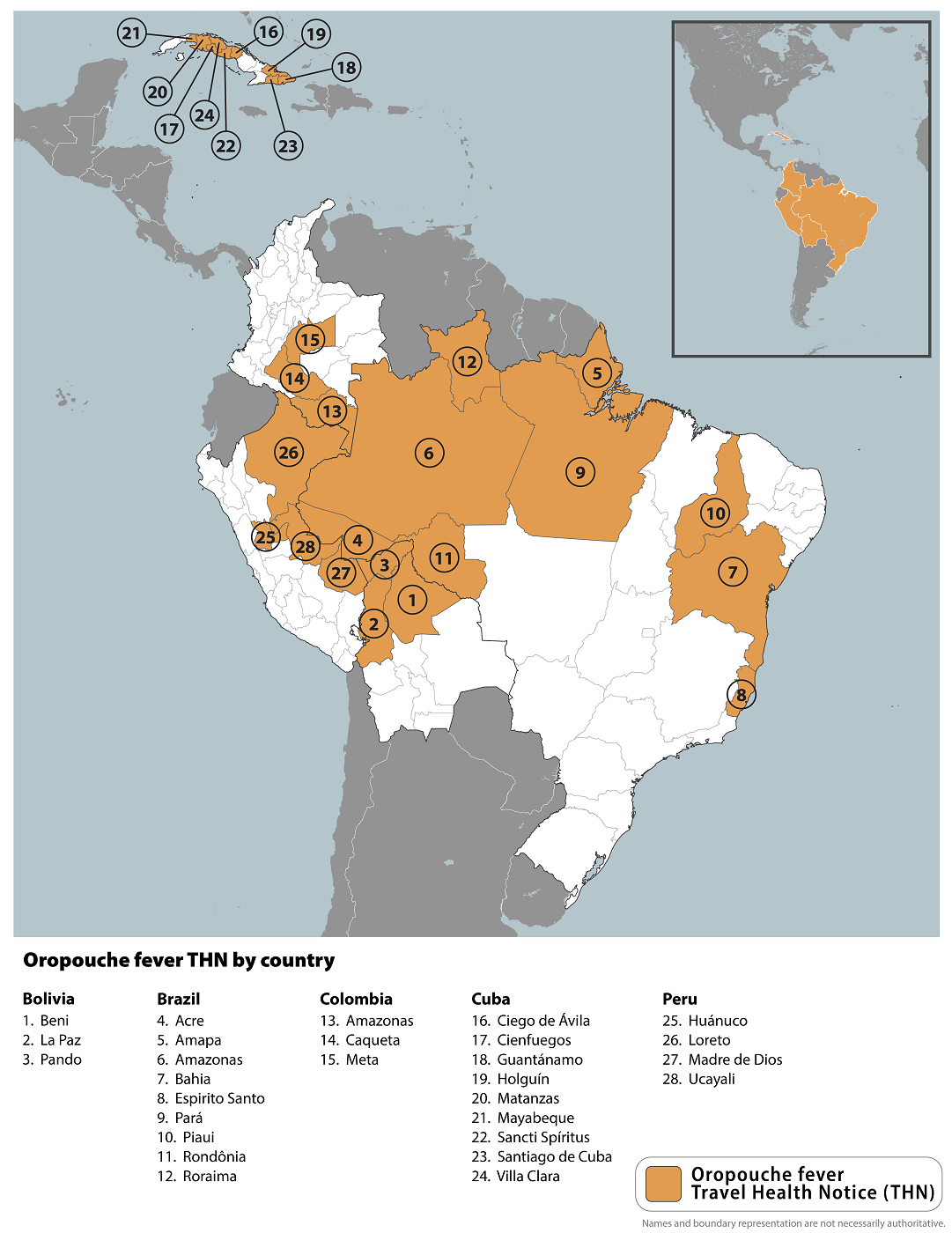Oropouche in the Americas
Level 4 - Avoid All Travel
Level 3 - Reconsider Nonessential Travel
Level 2 - Practice Enhanced Precautions
Level 1 - Practice Usual Precautions

Map: Areas in the Americas with reported cases of Oropouche (see larger map)
What is Oropouche?
Oropouche is a disease caused by Oropouche virus. It is spread primarily through the bites of infected biting midges (small flies) and mosquitoes. There have been possible cases of Oropouche virus being passed from a pregnant woman to her fetus.
Oropouche virus has been found in semen. It is unknown if Oropouche can be spread through sex.
Symptoms of Oropouche include headache, fever, muscle aches, stiff joints, nausea, vomiting, chills, or sensitivity to light. Severe cases may result in neuroinvasive disease such as meningitis.
Symptoms typically start 3–10 days after being bitten and last 3–6 days. Most people recover without long-term effects. There is no specific treatment for Oropouche.
Key points
- Areas in the following countries (see map) are reporting a low number of cases of Oropouche:
- Brazil
- Cuba
- Panama
- Peru
- Oropouche virus is spread primarily by the bite of infected midges (small flies) and mosquitoes.
- Oropouche virus can spread from a pregnant woman to her fetus.
- Infection during pregnancy has been associated with fetal deaths and congenital abnormalities.
- It is possible that Oropouche virus might spread through sex, but it has not yet been reported.
- Recent scientific reports found evidence of Oropouche virus and viral RNA (genetic material) in patients’ bodily fluids, such as semen or vaginal fluids.
- Travelers to affected areas should:
- Take steps to prevent bug bites.
- Consider using condoms or not having sex during travel and for 6 weeks after returning from travel.
- Illness can occur in people of any age and is often mistaken for dengue.
What Travelers Can Do to Protect Themselves and Others
- Travelers to affected areas should take steps to prevent bug bites during travel to protect themselves from infection. They should also prevent bug bites for 3 weeks after travel to avoid possibly spreading the virus to others in the U.S.
- If travelers are pregnant, they should discuss travel plans, reasons for travel, steps to prevent bug bites, and potential risks with their healthcare provider.
- Given the limited information on the risk of possible spread through sex, including the unknown of whether virus may be present in vaginal fluid, travelers and their partners concerned about possible sexual transmission of Oropouche virus can consider using condoms or not having sex during travel and for 6 weeks after returning from travel.
- Travelers who develop high fever, headache, muscle aches, stiff joints, nausea, vomiting, chills, or sensitivity to light during or within 2 weeks after travel should:
- Seek medical care immediately and tell their healthcare provider when and where they traveled. Learn how to seek medical care during travel.
- Not take aspirin or other NSAIDS (e.g., ibuprofen) due to the risk of bleeding. Acetaminophen is a safer option.
- Continue to prevent bug bites during the first week of illness to avoid further spread in areas where mosquitoes or biting midges are active.
- Travelers who have symptoms or are diagnosed with Oropouche should review additional prevention recommendations related to possible sexual transmission and semen donation.
For Clinicians
- Healthcare providers should inform women who are pregnant and considering travel to areas with reported Oropouche virus transmission of the possible risks to the fetus. If a woman who is pregnant decides to travel, counsel her to prevent bug bites.
- Recent publications have described two male patients with Oropouche virus disease who had virus and viral RNA detected in bodily fluids, including semen. A separate publication describes a patient who had Oropouche viral RNA detected in vaginal secretions and other bodily fluids.
- There have been no reports of transmission of Oropouche virus through sexual activity to date.
- CDC has interim recommendations for how to counsel patients on possible sexual transmission.
Traveler Information
- Health Information for Travelers to Brazil
- Health Information for Travelers to Cuba
- Health Information for Travelers to Panama
- Health Information for Travelers to Peru
- Oropouche Homepage
- Oropouche: Causes and How it Spreads
- PAHO Epidemiological Alert - Chikungunya and Oropouche in the Americas Region (PDF)